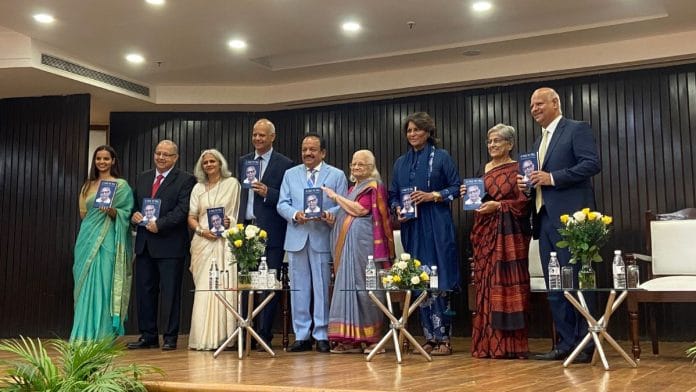New Delhi: It’s not every day that a doctor’s career is celebrated by former union ministers and heads of major hospital chains. But Dr. Ranjit Roy Chaudhury’s journey from Patna in Bihar, to Oxford in the United Kingdom, to Bangkok in Thailand, and back to India where he framed guidelines for clinical trials is a story that many want to hear.
Heavyweights in the medical sector such as former Union health minister Dr Harsh Vardhan and executive vice-chairperson of Apollo Hospitals Shobana Kamineni attended the posthumous launch of the late Padma Shri awardee’s memoir. Yet, it had the feeling of an intimate gathering of friends and family convening to celebrate the life and career of one of the country’s top clinical pharmacologists who passed away eight years ago.
Bring everyone in, leave no one out
In a country where doctors are not only highly respected but passionately revered, Roy Chaudhury was much loved for the intangible qualities that separate the good from the best—humility, humanity, fairness, and kindness. His innate human touch was as much a part of the conversation as his memoir, A Tale to Tell: An Extraordinary Journey in Medicine, at New Delhi’s India International Centre on 21 October.
“My father had a professional career that anyone would be proud of, and yet it absolutely pales in comparison before his real gift, which had really nothing to do with science or medicine, but had everything to do with the way that he could bring people together,” said his son, Dr Prabir Roy Chaudhury, professor in nephrology at the University of North Carolina (UNC) School of Medicine. It was a lesson Roy Chaudhury learned as a child while studying at St. Xavier’s High School in Patna.
Prabir deconstructed his father’s working life into a trio of constituent careers. First as a medical professional specialising in pharmacology at AIIMS Delhi and PGI Chandigarh, where he became the youngest head of department. Second at the WHO, working in Alexandria, Geneva, and Myanmar. Finally, starting in the 1990s, his career was centred on policymaking for national medical institutions.
Such was his capacity for empathy and kindness that when publishing firm Bloomsbury asked if there were any potentially libellous remarks in the book, the family said there was no problem in that regard.
Defamation simply wasn’t their father’s style.
Marrying tradition and modernity
Just as Roy Chaudhury looked to bring different people together, he also sought to unite divergent medical philosophies. And unlike many in his profession, he straddled modern and traditional medicine with ease.
It was my father’s view that “holistic treatment” is required in order to have “holistic health”, said his other son, Rahul Roy-Chaudhury, a senior fellow at the International Institute for Strategic Studies in London.
Roy Chaudhury worked towards the synthesis of the old and the new. He would take Vijayasar and Banjhauri plants to clinical trials for diabetes and contraception, respectively. These efforts were part of the overarching attempt to create a dialogic and mutually beneficial relationship between allopathic, ayurvedic, and unani medicines.
In the context of clinical trials, the shift towards human-based technologies is becoming increasingly significant. These advancements aim to enhance the efficacy and safety of drug development processes.
Kamineni recalled how Roy Chaudhury worked towards this with her father Pratap Reddy, the founder of the Apollo corporate chain.
The Apollo Group has, in fact, recently acquired a chain of Ayurvedic hospitals, Kamineni told the audience. In alignment with Roy Chaudhury’s approach, here is a modern corporation attempting to harness traditional techniques to meet contemporary challenges. From his memoirs, we see that Roy Chaudhury’s quest for a herbal contraceptive in the 20th century was informed by ancient texts: “I had read that our great ancient physician and teacher Charaka had written that women who take a combination of Embelia ribes (Vidanga), pipalli and borax would not conceive. A huge multidisciplinary task force was constituted.” It was in response to Roy Chaudhury’s research request that the government of India mobilised its top doctors.
Ethical medicine
Roy Chaudhury was at the heart of the major reconfiguration of the whole mechanism of approvals of drugs. He headed the National Expert Committee on Reforms in Drug Regulation and Clinical Trials to formulate policy guidelines for new drug approvals and clinical trials, which had nosedived after the Supreme Court’s alarm over many irregularities in clinical trials in 2013.
Yet, for Roy Chaudhury, the problem wasn’t the clinical trials. It was the ethical regulations, said Dr Sita Naik, a former member of the Board of Governors at the Medical Council of India.
He worked on the basis that India must pursue clinical trials to keep up with progress in the wider scientific community. At the same time, as Naik noted, “fellow Indians” remained central to Roy Chaudhury’s thinking.
The medical profession had to keep one eye on global developments and another on Indians’ safety. He worked towards the harmonisation of these two facets of clinical trials, again bringing those with different opinions together.
In 2013, the National Expert Committee on Reforms in Drug Regulation and Clinical Trials, chaired by Roy Chaudhury, made twenty-five recommendations to the government. Twenty-four of these were accepted and implemented. This may be part of the reason why Vardhan referred to Roy Chaudhury as “the conscience of the medical profession” in his speech.
It’s on the basis of Roy Chaudhury’s work that clinical trials have been resumed.
“Much of what he thought about, I think, is now being implemented, and therefore I’m sure there’s a happy soul somewhere, smiling with his usual tongue-in-cheek smile that said, ‘Look, I told you so’,” Naik concluded.
(Edited by Prashant)






